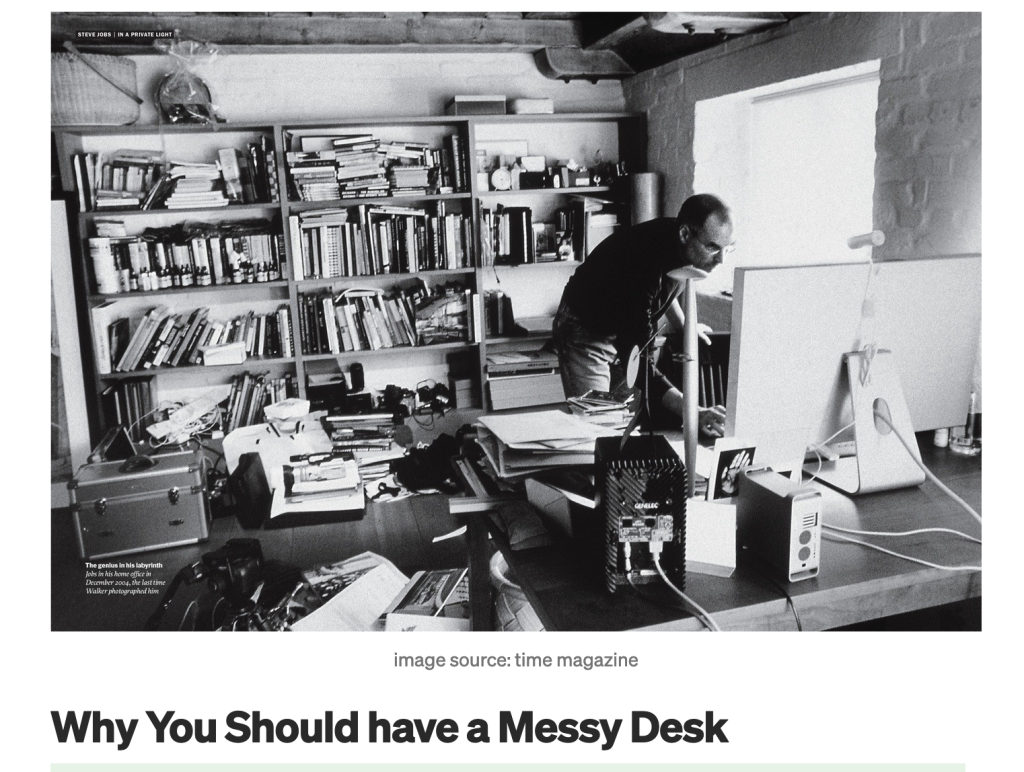Lovely article here about cluttered workspaces

https://medium.com/busy-building-things/why-you-should-have-a-messy-desk-c6e7b9b5bc1f

Lovely article here about cluttered workspaces

https://medium.com/busy-building-things/why-you-should-have-a-messy-desk-c6e7b9b5bc1f
I’ve written extensively about how physical spaces influence thinking (e.g. Future Minds, Fast Company etc.), but I didn’t realise until recently just how much research there was on this. For example, Joan Meyers-Levy and Juliet Zhu, two Profs at the University of Minnesota, ran a study that found that high ceilings activated abstract thinking and thoughts of freedom, whereas low ceilings activated concrete thinking and thoughts of confinement. In other words, high ceilings are good for inspiration and big idea generation whereas low ceilings are good for small detail and implementation.
A further twist on this is the idea of cells, hives, dens and clubs espoused by Francis Duffy at DEGW architects. The basic idea here is that hive offices suit routine or low level process work with low levels of social mixing and autonomy, cell offices facilitate focused brain work with little social interaction, den-type offices suit team work and club offices do a little bit of everything.
This possibly explains why my solitary home office is useful for some tasks, my busy boat office for other tasks and the manic café best for something else.
Related.
http://ergo.in/paw_funatwork.html
http://www.sussex.ac.uk/Users/geraldin/Publications/AUIC-final.pdf
http://www.flexibility.co.uk/flexwork/offices/facilities4.htm
This makes a lot of sense to me. I’ve been writing Future Files 2 from my home office for the last few months and things are going well. I can pick tomatoes from the greenhouse on the way to work and the office is full of natural light. Contrast this with the situation six months ago when the office was dark and I couldn’t seem to get anything done.
I read today that a study published in the Journal of Clinical Sleep Medicine says that working in a windowless, or dark, office can result in disturbed sleep patterns. Workers who sit close to a window, or other source of natural light, have better moods and more focus.
Prolonged lack of natural light can result in poor sleep, which is itself linked to obesity, diabetes and heart problems. Interestingly, positive effects are only achieved with exposure to daylight, which contains what’s known as blue light, and not with exposure to general office or household lighting, which does not.
Overall, my home office (the other one is on a ship in the Thames) is great for six months of the year (when it’s warm and light), but even then there’s something important that’s missing. It’s people. I think this is what the whole telecommuter, flexi-working, work anywhere you want thing misses and why it’s so hard to get a seat to drink your coffee in Starbucks – because the place is full of people working.
There are times when a lack of people is a really good thing. There are times when peace and quiet reign supreme. But at other times we need to interact with people, even if all we do is sit alongside someone and say nothing.
I don’t know Jacob Morgan. I’m sure he’s a nice guy, but I think he suffers from being too young. Or perhaps he is just too focused on technology.
He has just written a very good article called 8 Indisputable Reasons Why We Don’t Need Offices. He has a point. 8 in fact.
After all, why, in a world of global connectivity and collaboration (and endless branches of Starbucks) do we need physical offices, especially if the work that people are doing in offices is increasingly information work that can be done anywhere in the world?
He quotes a statistic from a survey by Regus that states that of 26,000 businesses across 90 countries, 48% work remotely for at least 50% of the week. But look at the motive here. What does Regus sell? Office space for people that don’t have or need a full-time office. It is in their interest to persuade companies to downsize, much as it is in the interest of certain technology forms to push teleconferencing.
Morgan points wisely to the fact that companies save money when offices become virtual and employees save time when they are not physically moving to and from a physical workplace. There’s even an argument, not totally screwy, that employees are more productive when they work from home.
This is all good. But who really benefits from all this and what is the ultimate end result? The answer, I’d argue, is that it’s companies that benefit the most from this. Companies save money, lots of it, not simply because they can reduce the size of their physical workspaces, but because once employees are out of sight it is easier to shift them towards towards freelance and ultimately zero hours status.
Morgan is spot in in his conclusion that organisations need to implement more flexible work environments (to which I’d add contracts), but the fact of the matter is that looking just at money or even time saving is only one side of a complex coin and he, like many others, confuses efficiency with effectiveness.
Work shouldn’t just be about money. Work is also about community and meaning.
Work provides a sense of friendship and community, a type of friendship and community that can be partly enhanced but not fully replicated digitally.
More fundamentally, physical offices provide a critical boundary and balance, which is important to our sense of identity. If everywhere becomes work then work is all that we will become.